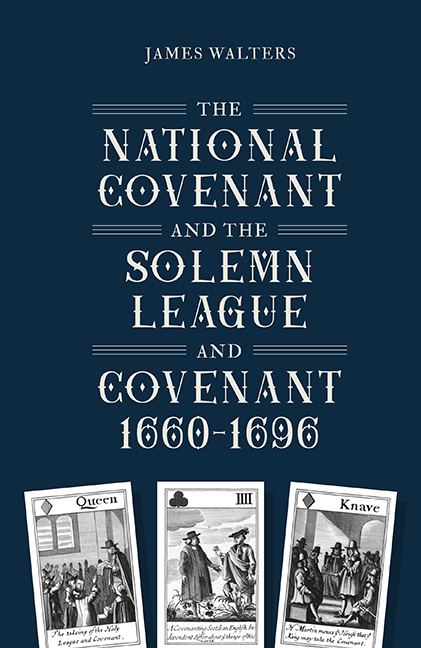Book contents
- Frontmatter
- Contentst
- List of Illustrations
- Acknowledgements
- Introduction
- 1 The 1638 National Covenant and the 1643 Solemn League and Covenant
- 2 1660: What Was to Be Restored?
- 3 The Act of Uniformity and the ‘Great Ejection’
- 4 Crisis and Toleration in the 1660s
- 5 Exclusion and Association in the Late Restoration Period
- 6 The Revolution of 1688 and the Association of 1696
- Conclusion
- Bibliography
- Index
- STUDIES IN EARLY MODERN CULTURAL, POLITICAL AND SOCIAL HISTORY
3 - The Act of Uniformity and the ‘Great Ejection’
Published online by Cambridge University Press: 26 May 2022
- Frontmatter
- Contentst
- List of Illustrations
- Acknowledgements
- Introduction
- 1 The 1638 National Covenant and the 1643 Solemn League and Covenant
- 2 1660: What Was to Be Restored?
- 3 The Act of Uniformity and the ‘Great Ejection’
- 4 Crisis and Toleration in the 1660s
- 5 Exclusion and Association in the Late Restoration Period
- 6 The Revolution of 1688 and the Association of 1696
- Conclusion
- Bibliography
- Index
- STUDIES IN EARLY MODERN CULTURAL, POLITICAL AND SOCIAL HISTORY
Summary
The 1662 Act of Uniformity introduced a Book of Common Prayer, and required that all clergy declare their ‘unfeigned assent and consent’ to the use of the book's contents in their worship, or face ejection from the church. The passage of this act, and the subsequent ejection from the Church of England of approximately two thousand presbyterian and puritan ministers who refused the settlement which the act laid out, was seen by many as the quintessential moment of failure for the Covenanter project. The passage of the act completely ruled out any official place for presbyterianism, or a settlement compatible with the Solemn League and Covenant. The ‘Great Ejection’ of presbyterian ministers from the church, also referred to as ‘Black St Bartholomew's Day’, created a dramatic divide between those who chose to lose their ministry and their livelihoods by rejecting the new settlement, and those who accepted it. Despite this, however, the Solemn League and Covenant still formed a key part of the political thinking not only of radical Covenanters who rejected any engagement with the regime, but also of people who accepted or actively supported the Restoration, and who continued in various ways to engage with both the regime and the established Church of England. In other respects, however, this period continued to see the Solemn League and Covenant become ever more associated with schism and an incompatibility with the Restoration settlement.
As discussed in the previous chapter, hopes were initially high for a compromise between presbyterianism and episcopacy in the aftermath of the Restoration. Historians have debated the extent to which such compromise was ever really achievable, and to what extent the bishops, once it became apparent that they had a majority of support in the House of Commons, ever really intended to offer substantive concessions. Tim Cooper has argued that by the time of the Savoy Conference, called in 1661 in an attempt to define the religious nature of the Restoration settlement, serious concessions to presbyterians were already unlikely, and that presbyterians such as Richard Baxter were likely aware of this. Alasdair Raffe has also noted that concerns about the implications of presbyterianism for the strength of the restored monarchy meant that its exclusion from the church settlement in Scotland had always been probable.
- Type
- Chapter
- Information
- Publisher: Boydell & BrewerPrint publication year: 2022

